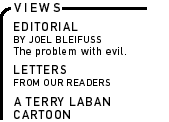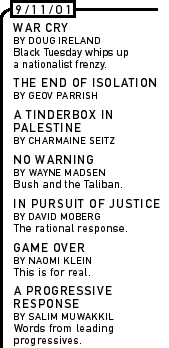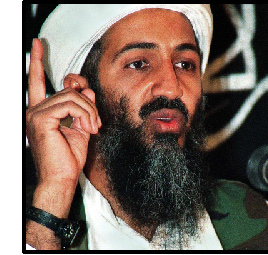|
|

|

|

|
|
|
| |
|
|
|
Now that fingers are pointing to Osama bin Laden as the prime suspect behind the hijacked plane attacks against the World Trade Center and the Pentagon, informed sources are wondering why more wasn't done to rein in bin Laden or infiltrate his inner circle. As In These Times went to press, numerous scenarios were suggested for how the attacks had been planned and carried out. Sources close to the Lebanese Hezbollah and the London-based al-Muhajiroun Islamic movement say the terrorist attacks on New York and Washington were possibly aided by members of Iraqi intelligence. Al-Muhajiroun is headed by Syrian-born Sheik Omar Bakri, who, while not an associate of bin Laden, has supported his cause with rhetorical denunciations of the West in general and the United States in particular. The Iraqi pilot scenario might explain how the commercial pilots of American and United airlines flights were so easily replaced by terrorist pilots. Another source familiar with bin Laden's al-Qaeda network suggested some of the
Yet another scenario--backed by information from sources knowledgeable about al-Qaeda--is that the terrorist pilots were trained by bin Laden within Afghanistan. A Federal Aviation Administration source, speaking on conditions of anonymity, claimed a likely scenario was that the some of the terrorists cleared security at overseas airports and then transferred to the domestic flights upon their arrival in the United States. In what may be the worst case of "what goes around, comes around," an Iranian source has reported that the 20 terrorists may have been given phony passports by officials of Pakistan's Inter-Services Intelligence (ISI)--the top intelligence agency in the country. The passports were supposedly used by the terrorists to transit through Europe and to eventually enter the United States. It was the ISI, during the '80s, that funneled CIA weapons and money to the mujahedin forces in Afghanistan. If it is true that the terrorists were aided by Pakistani government officials, Islamabad may join Kabul as a target for American military retaliation. Bin Laden's fingerprints on the attack may also have a historical precedent. In 1995, the laptop computer of Ramzi Yousef, a bin Laden associate, was confiscated in the Philippines. Police discovered that Yousef planned to hijack 11 inbound U.S. commercial aircraft taking off from Asia. The plan then may have been to blow them up in mid-air or crash them into targets in the United States. Those who have followed the warming of relations between the Bush administration and Kabul are asking why the Bush administration wasn't alerted to an impending attack through Taliban back-channels. According to sources close to the Taliban and Pakistan's Jamiaat-i-Islami Party--the Pakistani fundamentalist movement that nurtured and trained the Taliban--a senior Jamiaat official, Qazi Husein Ahmad, recently traveled to both London and Washington. While in Washington, he reportedly re-established ties with the Taliban's old CIA contacts from the Reagan and first Bush administrations. Ahmad is the second Islamist radical to have been welcomed by Langley in recent months. No sooner had the Bush administration taken over than the Taliban's ambassador-at-large, Rahmatullah Hashami, sat down with senior CIA, State and Pentagon officials in a meeting arranged by Laili Helms, the Taliban's unofficial representative in the United States and niece-in-law of Richard Helms, former CIA director and U.S. ambassador to Iran. According to Pakistani sources, the Taliban and the Pakistani veterans of the CIA-led mujahedin war against the Soviets had been keen to rekindle old ties with the former South Asia CIA chief Richard Armitage, now Secretary of State Colin Powell's deputy, and Christina Rocca, assistant secretary of state for South Asia, who is a 15-year veteran of the CIA's Operations Directorate, a position where she also interfaced with the Islamist guerrillas. Rocca had previously met in Islamabad with Mullah Abdul Salam Zaeef, the Taliban ambassador to Pakistan, and his assistant, Sohail Shaheen. Armitage, however, is considered anti-Taliban because he favors restoring the elderly ousted Afghan monarch, King Zahir Shah, to power. Powell was reportedly upset about the re-establishment of ties with the Taliban and Pakistani Islamists, but has apparently been overruled by the dominant CIA interests in the administration. Intelligence sources point out that, for its part, the CIA wanted to re-establish contact with murky ex-mujahedin and Taliban-allied arms- and drug-smuggling fronts in Rawalpindi and Peshawar. According to one senior U.S. government source, the Taliban's greatest cheerleaders are the CIA and the State Department's Bureau of Intelligence and Research. The source said the CIA had always argued that bin Laden was "overblown" as a threat. The United States has recently tilted toward the Taliban and against the anti-Taliban Northern Alliance of Gen. Ahmed Shah Massoud. The Defense Department largely supports Massoud, but the CIA and State Department argue that supporting the general would put the United States on the same side as Russia and Iran--his two major backers. Massoud was the target of a suicide bomb assassination attempt by two bin Laden allies disguised as television journalists the day before the attack on the United States. (At press time, there were conflicting reports as to whether he was dead or alive.) But that did not stop Massoud's forces from launching a missile attack on Kabul Airport the night of September 11--to the delight of many Americans, many of whom were surprised it was not a U.S. military attack. After the recovery and mourning period, Washington will go into its traditional finger-pointing mode. Then, the CIA and other Bush administration officials who have had close contact with the Taliban should be asked by Congress about the nature of their relationships with the protectors of bin Laden. For starters, CIA Director George Tenet should be asked what the United States received in return for even talking to the brutal mullahs who run Kabul. The State Department should be questioned as to why it has banned Massoud's movement from occupying the vacant Afghan Embassy in Washington even though it is recognized by the United Nations as the legitimate government of Afghanistan. At the very least, the American people deserve to know why the
Bush administration, through its words and actions, has given tacit
support to a government that has provided safe haven to the man
who may be the worst mass murderer of American civilians in the
nation's history. Wayne Madsen is an investigative journalist based in Washington and the author of Genocide and Covert Operations in Africa.
|






